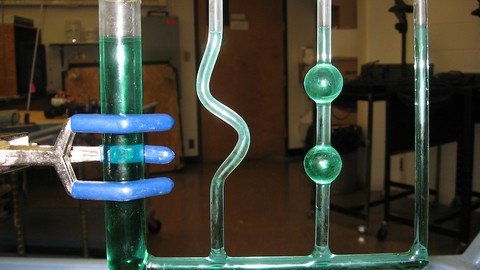Apply Static Fluid Mechanics Concept

Free Download Apply Static Fluid Mechanics Concept
Published 5/2024
MP4 | Video: h264, 1920×1080 | Audio: AAC, 44.1 KHz
Language: English | Size: 696.95 MB | Duration: 2h 44m
Static Fluid
What you’ll learn
Learn about definition of “fluid mechanics science” .
Know the scope of “fluid mechanics science”.
Know the difference between dimensions and units .
Learn about primary dimensions and units.
Learn about main fluid properties.
Calculate the viscosity for plate moving with uniform velocity.
Calculate the viscosity for cylinder moving with uniform velocity .
Learn about Newtonian fluids.
Learn about Non-Newtonian fluids.
Define “Ideal fluid concept “.
Know the difference between real and ideal fluid.
Learn about “Rheological Diagram”.
How to draw flow velocity and shear stress distribution in pipes.
How to draw flow velocity and shear stress distribution in open channel
What is the surface tension.
Calculate of surface tension.
Calculate of the pressure inside a water droplet .
Calculate of the pressure inside a soap bubble.
Learn about vapor pressure of liquids.
Learn about “Pascal’s Law”.
Calculate of pressure at point in a static fluid.
Calculate equivalent fluid columns for atmospheric pressure.
Calculate gauge pressure and absolute pressure.
Learn about vacuum pressure.
Learn about “Compressibility” of fluids.
Learn about pressure measurements by manometer.
Learn about types of manometers.
Calculate of hydrostatic forces on inclined submerged surface.
Calculate of hydrostatic forces on horizontal submerged surface.
Calculate of hydrostatic forces on vertical submerged surface.
Calculate of hydrostatic forces on curved surface.
Learn about “Buoyancy”.
Learn about buoyant force.
Learn about applications of Archimedes Principle.
Learn about equation of continuity of a fluid in three-dimensional flow.
Learn about stream function for two-dimensional incompressible flow.
Learn about potential velocity function for two-dimensional incompressible flow.
Learn about irrotational flow.
Learn about acceleration of fluid particles.
Requirements
• Basics of Civil Engineering
• Basics of Math
• Basis of Physics
Description
This course is best suitable for the students who find “static fluid” subject as difficult, because all the complex problems are discussed in simple manner on cloud whiteboard technology, also advanced power point presentations, animations are used so as students should understand in easiest way.This course is structured into five sections with 14 lectures, each covering a specific topic related to Static FluidThe sections are as follows:Section 1: Static Fluid Introduction§In this section, you will know about the author, course objectives and components. You will know the fluid mechanics definition and scope. And you will learn the difference between dimensions and units.Section 2: Fluid PropertiesIn this section, you will Learn about main fluid properties, how to calculate the viscosity for plate and cylinder moving with uniform velocity. You will learn about Newtonian, Non-Newtonian and Ideal fluids. You will know the difference between real and ideal fluid and “Rheological Diagram”.You will learn how to draw flow velocity and shear stress distribution in pipes and in open channel. You will know the surface tension and how to calculate it.You will also know how to calculate of the pressure inside a water droplet and a soap bubble.Section 3: Static PressureIn this section, you will Learn about vapor pressure of liquids and “Pascal’s Law”. You will learn how to calculate the pressure at point in a static fluid and calculate equivalent fluid columns for atmospheric pressure.You will learn how to calculate gauge pressure and absolute pressure, learn about vacuum pressure and “Compressibility” of fluids. You will also learn about pressure measurements by manometer and types of manometers.Section 4: Hydrostatic ForcesIn this section, you will know how to calculate the hydrostatic forces on inclined, horizontal and vertical submerged surface. You will learn how to calculate the hydrostatic forces on curved surface. You will learn about buoyancy, buoyant force and Archimedes Principle.Section 5: Fluid MotionIn this section, you will learn about equation of continuity of a fluid in three-dimensional flow. You will learn about stream function and potential velocity function for two-dimensional incompressible flow. You will learn about irrotational flow. You will also, learn about acceleration of fluid particles.All sections are covered with solved examples.By the end of this course:You will have a solid understanding of the theory and practice of static fluid.You will be able to apply your knowledge and skills to solve real-world problems related to static fluid and its application.
Overview
Section 1: Static Fluid Introduction
Lecture 1 Welcome Lecture
Lecture 2 Lecture 1
Section 2: Fluid Properties
Lecture 3 Lecture 2
Lecture 4 Lecture 3
Lecture 5 Lecture 4
Lecture 6 Lecture 5
Section 3: Static Pressure
Lecture 7 Lecture 6
Lecture 8 Lecture 7
Lecture 9 Lecture 8
Section 4: Hydrostatic Forces
Lecture 10 Lecture 9
Lecture 11 Lecture 10
Lecture 12 Lecture 11
Section 5: Fluid Motion
Lecture 13 Lecture 12
Lecture 14 Lecture 13
• Civil engineering students,• All personal involved in water engineering
Homepage
https://www.udemy.com/course/apply-static-fluid-mechanics-concept/
DONWLOAD FROM RAPIDGATOR
nyglu.Apply.Static.Fluid.Mechanics.Concept.rar.html
DONWLOAD FROM UPLOADGIG
nyglu.Apply.Static.Fluid.Mechanics.Concept.rar
Fikper
nyglu.Apply.Static.Fluid.Mechanics.Concept.rar.html

